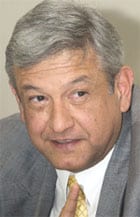With elections due to take place in a half-dozen Latin American nations over the next year, investors are anxiously following events in the region. Theyre expecting some significant changes.
 |
|
|
Combined, these polls will determine whether Latin America shifts further to the left or maintains the market-friendly policies that dominated the region in the 1990s. Already, leftist governments are in power in Argentina, Brazil, Uruguay and Venezuela.
 |
|
|
While AMLOs political partys name might strike fear into the hearts of investors, his policies may not be quite so revolutionary. I dont think hell do anything crazy, says John Welch, chief Latin America economist with Lehman Brothers. Weve already seen some signs that hes moving to the center. In the end, AMLO may become another Lula, heavy on leftist rhetoric before the election but a pragmatist after, several investors and analysts believe. Says Alfredo Thorne, the Mexico City-based chief of Latin America research for JPMorgan Chase, To be honest, it may just be political rhetoric.
When Brazils Lula was first elected, the markets wobbled but gradually recovered. Investors are expecting a similar outcome if other countries in Latin America move further to the left. I do think well see turbulence, Welch says, especially on the currency sides. Lehman expects the Mexican peso to weaken this year and more going into the July elections, he says. To a certain extent, AMLO has already started affecting stocks and bonds, says Enrique Alvarez, Latin America debt strategist at research company IDEAGlobal. Hes obviously the frontrunner, he says. The market tends to discount that in advance.
And even if AMLO wanted to continue his leftist agenda after the elections, he would likely face a divided congress, as current President Vicente Fox has. AMLO has to take measure of how the parties are organized in congress, says Pedro Tuesta, Washington, DC-based senior Latin America economist, 4Cast. The institutions in Mexico are strong enough to have a leftist government.
There is still widespread skepticism among economists in Mexico that AMLO will actually win. He still faces rivalry within his own party and will have to counter the effects of increased campaigning from other leading candidates as the election nears. They expect AMLO to face strong opposition as the machinery gets going into the election, says Welch. He believes that AMLO will win in the end, though.
|
Causes for Concern |
||
Michelle Bachelet, the Rontrunner in Chile, is Expected to Continue the Market-Friendly Policies of the Outgoing President
For international investors, the main concern is Brazilby far the top bond issuer in Latin America and the origin of most of the regions ADRs in New York. Brazil is the overriding concern, says Welch. The corruption scandal has been bad news for investors, who had been generally pleased with Lula. And, until recently, hed been a sure-bet at winning re-election in October 2006. Now, the Brazilian president is facing several scenarios, with mixed results for the markets. Even if he isnt impeached, that wont necessarily be good news, investors believe. Hell be extremely weak going into the election [and] may end up not running at all, says Welch. That would leave candidates such as finance minister Antonio Palocci and So Paulo mayor Jos Serra, he says. Serra would probably win that election, spelling good news for the markets. Serra lost the last election to Lula but has received praise for his management of So Paulo in the interim and gains from having no ties to the corruption scandals in the current government. But if Lula were to run for re-election, what could happen? The problem for the market right now is if Lula decides to throw the house out the window to win popularity, warns 4Casts Tuesta. Colombia represents another uncertainty. President Alvaro Uribe, whose policies have been popular with investors, is trying to run for re-election despite a constitutional ban on this. The countrys Constitutional Court is expected to rule on the matter later this year. Thats a problem, says Tuesta. We dont know whether Uribe can run. There will be more market movement if he cant run than if he can, forecasts Welch. In neighboring Peru, the outlook is also uncertain. President Alejandro Toledo, whose constant policy flip-flops have been unpopular in the business community, cannot run for re-election in the April elections. Despite naming five prime ministers since assuming office a little over four years ago, Toledo has been fortunate enough to see Perus economy grow strongly the past few years. This president, as bad as he is, didnt go back [on key market reforms], Tuesta says. With commodities doing well, its been easy to manage a good economy. Pedro Pablo Kuczynski, a former managing director at Credit Suisse First Boston who was named prime minister in August, is popular among investors but has ruled out running. On the other hand, neither will Alan Garcia, a former president who defaulted on Perus debt in the 1980s. That, at least, is good news for investors, Tuesta says. Despite the possibility that Bolivia will elect Evo Morales, a radical coca activist, in elections in December, most investors say that will have little effect beyond the South American country. Bolivia is very tiny within the overall spectrum of Latin America, says Alvarez. Morales is a close ally of Hugo Chavez in Venezuela, where oil continues to keep the value of the countrys bonds high despite the anti-market policies of the president. Venezuela is slated to hold elections in December 2006, which Chavez likely will win. In the case of Venezuela, you wont see any changes in current policies so long as crude oil continues high, says Alvarez. Another country expecting few changes, even after the December 2005 elections, is Chile. Frontrunner Michelle Bachelet from the ruling centrist coalition is expected to continue the largely market-friendly policies of outgoing president Ricardo Lagos. I think certainly Chavez has made his point of being a very populist leader, says Thorne. But there are lots of incentives for other presidents to disagree. Lula, for example, came with strong rhetoric and realized that putting aside the rhetoric was much better for the population at large, he says. Most investors hope that will be the result in Mexico as well. |
Joachim Bamrud




